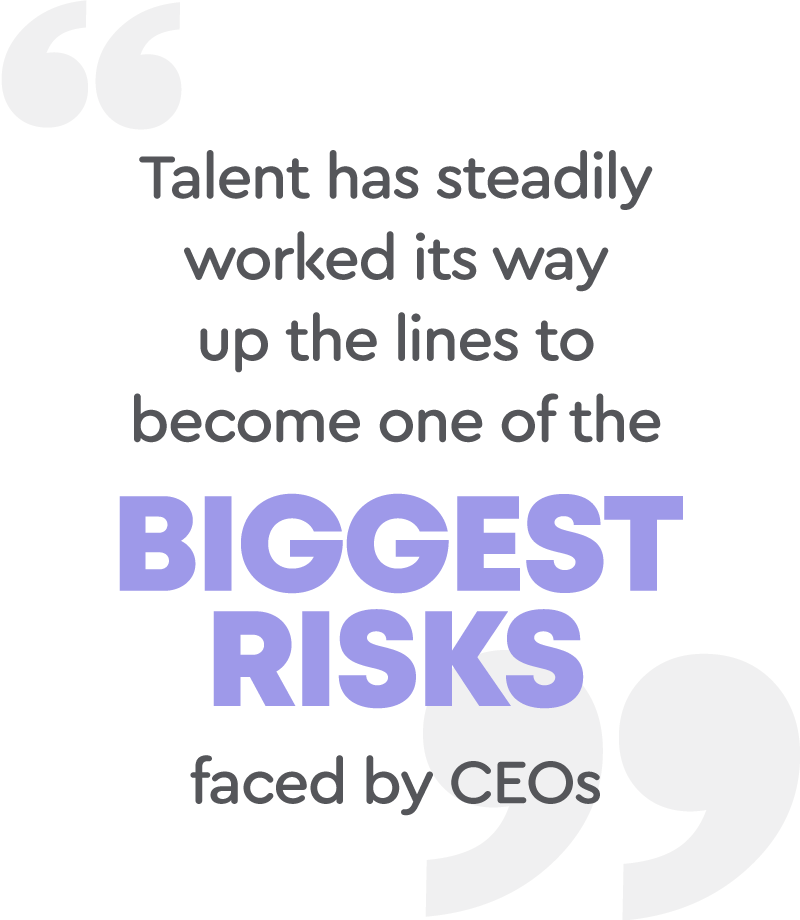The Need for Great Talent: Why Talent Remains the #1 Priority for CEOs

Talent. Defined as natural aptitude or skill. Is it genetic? Is it learned? Or is it a little bit of both? While some may argue over where talent comes from, we can all agree that talent is what is needed for individual success. And when you combine a group of talented individuals on one team, it leads to organizational success.
Since the start of the pandemic, the importance of talent has steadily worked its way up the lines to become one of the biggest risks and challenges faced by CEOs. It has been over 20 years since McKinsey coined the term “the war for talent” and it rings even more true today. Why? Because a lot can go wrong when you hire the wrong people.
What happens when you hire the wrong candidate?
The average cost of a bad hire is about 30% of the employee’s first-year salary. If that isn’t enough to get you committed to finding the right talent, a bad hire can also cause:
- Time lost to hire and train a new employee
- Decreased productivity
- Increased tension among employees
- Negative impact on client relationships
What happens when you hire the right people?
- Organizational alignment is created. Talent is a key factor in alignment. There are two components in organizational alignment – the alignment with a center (thought) and the alignment with movement (action). You combine the thinking of people around one point of reference with talent focused on activities that move the organization toward success and you create organizational alignment. RJ Heckman, author of The Talent Manifesto noted that many CEOs are struggling with growth and differentiation and are turning toward their teams for help. These teams need to be made up of the right talent for successful execution, which is why alignment is more important than ever.
- Performance. High-performing employees have three things in common: talent, high-engagement, and experience. People’s innate talents have a huge effect on how they will do their jobs, with research showing that talent is the strongest predictor of employee performance. That’s why even employees who lack experience but possess innate talent will produce above-average performances. And this applies to all job levels – a Gallup survey showed that companies that increase their number of talented managers and double the rate of employee engagement, produce approximately 147 percent higher earnings per share than their competitors.
- Stronger Business Outcomes. Hiring the strongest talent and placing that talent in the right role has a huge effect on your business outcomes. Think of it as planning a family party. Everyone has a role – Dave is in charge of dinner because he is by far the best chef in the family and enjoys cooking. Anne is handling decorations because she has a unique sense of style and a creative eye. Laney is sending out the invitations because she is a list master and is by far the most organized person in the group. We choose the roles each person plays based on their strengths and talents. If Dave was heading up invites, everyone may receive it in the mail after the actual party date. And if Laney cooks, you better start practicing your poker face and place yourself at the best table spot to sneakily share your burnt Steak Diane with the dog, Fido. Talent optimization is driven by your business strategy. If you find the right people, and place them in the right situations, you are better equipped to deliver the business outcomes you and your company desire.
- Increased Growth. Vince Molinaro, author of The Leadership Contract, says “Growth can be heavily impacted by the talent you have.” In a recent CGMA report, 40 percent of executives noted that ignoring the importance of talent and weak talent management has impeded their ability to innovate, expand markets, and complete major projects. It has also affected their growth forecasting and has caused a decline in their companies’ competitiveness. The talent on your team has a direct effect on your company’s ability to grow. An HR plan committed to hiring top talent is critical for success.
Get started finding the right talent
Identifying and hiring the wrong talent costs companies billions of dollars annually. In the midst of the pandemic, and moving forward, the importance of talent and finding the right people needs to be at the forefront of your hiring process. And using interviewing tools, like interviewstream, that enable you to find that talent simply and efficiently is critical to your success.
Start by diagnosing the areas of your company where you lack talent, design a plan to find and hire the right people, and most importantly, give your hiring teams the tools and knowledge they need to effectively evaluate candidates. Learn more about how your team can improve the effectiveness of their hiring decisions and simplify their interviewing process by speaking to an interviewstream expert today.
About The Author
Ryan Royal is the Chief Technology Officer at interviewstream. He pairs a start-up mentality with creative problem solving to turn vision into reality. When not leading the charge on new technological frontiers or working on lowering his golf handicap, Ryan likes to hang out in this woodworking shop building custom furniture.
